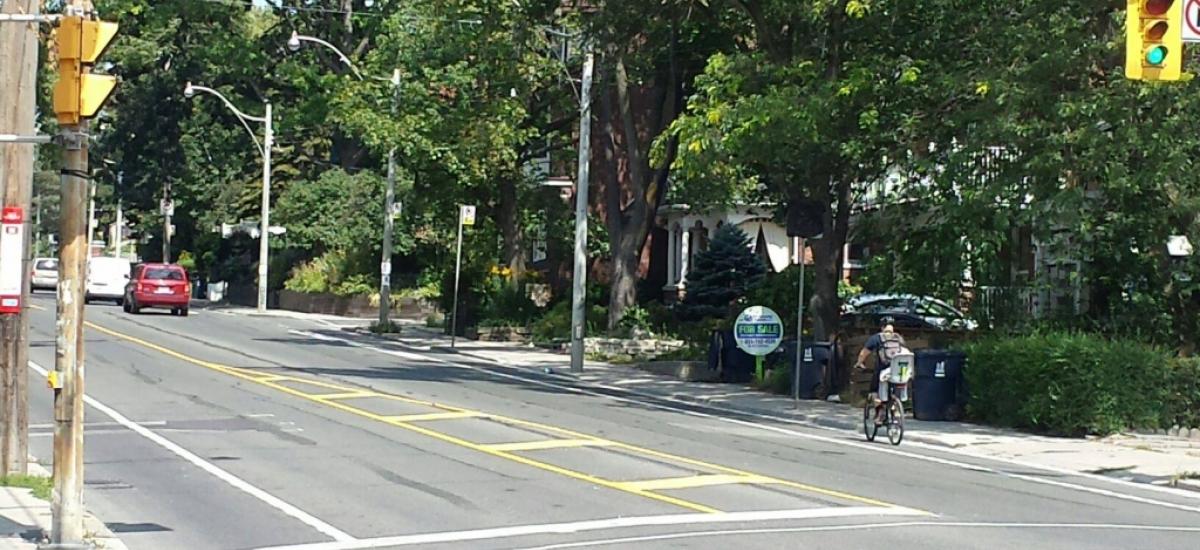32 Spokes responds to The Sun's critique of the Woodbine bike lanes

Bike lanes were installed on Woodbine Ave. in the summer of 2017. These lanes are an important north-south connection through East Toronto, with the closest parallel route being nearly two km to the west on Greenwood Ave. (and only extending north to the Danforth).
The City's Public Consultation Unit released new data supporting the Woodbine bike lanes in August 2018 - one year after installation (read our take on the counts and why we expect numbers to keep increasing).
However, certain columnists feel that the bike lanes are not appropriate for the neighbourhood, and that the latest counts don't offer substantial evidence of their success.
Here's a thoughtful response from 32 Spokes, one of our active ward groups in the Beaches-East York area.
--
Good day, Mr. Kingstone;
Sue Ann Levy's September 6 article on the Woodbine bike lanes raises valid points. As the 2016 counting demonstrates, the city's methodologies are often difficult to follow. And the total volumes of cycle traffic achieved a year in certainly aren't mind-blowing.
The city can be its own worst enemy when it comes to implementation: the lanes were installed late last summer when Coxwell was closed for construction and Woodbine was shouldering that traffic. As a driver, the new parking system caused confusion–I witnessed drivers "pulling up to a stop" behind what were actually parked cars all through the autumn. The signage was confusing and inconsistent. The Kingston/Woodbine intersection, certainly wasn't fixed. Many people in the Queen and Woodbine area clearly feel that this design was imposed on them without consultation.
But I'm not sure that the bike lanes represent a form of social engineering. If anything, Toronto's grand experiment in social engineering was in the years when it encouraged rapid growth while ignoring its out-dated transit, jam-packed roads, and the escalating toll in human life. In 1995, when I first moved to the city it was possible to get around with relative ease. The population was–according to Wikipedia–around 2,300,000. Now it's 2,700,000; an increase equal to the entire population of Halifax. At the same time, the GTA grew from around 4.5m to 6.7m. The population density of Toronto (proper) is now at 2/3 of Tokyo's and climbing with every new condo and office tower–a trend that will continue as long as Toronto remains the province's and country's center of job creation. The transit infrastructure hasn’t kept up, and it's no surprise that people are frustrated. Or that this frustration, when expressed by aggressive driving, is leading to troubling increases in deaths and serious injury for people walking and biking. In fact, I see no end in sight if we carry on as we are. The Woodbine cycle lanes are flawed but they represent an attempt at a break with more of what wasn't working.
Ms. Levy is right to point to a couple of hundred daily riders as a weak indicator of success. But numbers aren’t everything, and there are promising signs: as a cycle commuter on Woodbine both before and after the lanes went in,I've seen parents teaching their kids to ride on the city's larger streets by using Woodbine. I've seen families biking together. I've seen people shopping with their bikes. And I've noticed more people on the sidewalks, especially north of Danforth. I don't know if it's the buffer of having the cycle lanes between the sidewalk and the cars, but I just see more people around. You can’t argue that having more people out and about on our streets isn’t good for the neighbourhood.
I'm a member of a cycle advocacy organization called Cycle Toronto. Our local chapter, called 32 Spokes, has been working with the city and local residents to advocate for an evolution of the Woodbine cycle lanes. With the support of city staff and the Councillor, we've been looking for solutions on lost parking, increased traffic on side-roads, and those added minutes of travel time. As residents, as drivers, and as cyclists we have ideas, energy, and motivation to find a path to Toronto's success. Toronto's decades of inaction are over but the emergency is not yet resolved and it will take all of us to solve. And toward that end, I applaud Ms. Levy's continued holding the city to account.
Michael Werneburg
Cycle Toronto
32 Spokes
